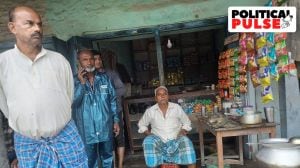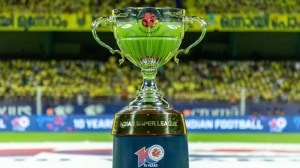Local anaesthesia helped skirt officiating PM’ debate
NEW DELHI, Oct 12: Regional'' anaesthesia which Prime Minister A.B. Vajpayee was administered during his knee operation turned out to be...

NEW DELHI, Oct 12: “Regional” anaesthesia which Prime Minister A.B. Vajpayee was administered during his knee operation turned out to be a handy tool, medically and politically.
When Home Minister L.K. Advani spoke to Vajpayee on the telephone from Delhi Wednesday morning enquiring about his well-being, Vajpayee told him, with wonder and worry, that surprisingly he felt no pain at all. Thanks to regional anaesthesia, the PM was neither unconscious nor fully conscious during his surgery.
Advani told The Indian Express on Wednesday that the doctors at the Breach Candy Hospital had told him at that while the PM would not be unconscious, he would not be able to recall what happened during the course of the operation. Advani was chatting with a group of persons after the function at Vigyan Bhavan marking Jayaprakash Narayan’s birth anniversary and the launching a national debate on reforms, economic, electoral, judicial.
PM’s surgery has revived an issue, of the need for an officiating Prime Minister, which has been debated for 50 years but which remains unsettled.
In this instance, technically speaking, an officiating Prime Minister was not necessary with the Prime Minister “not unconscious” during surgery. But Advani’s presence in the hospital all through Tuesday told its own story. Though the PM had told his ministerial colleagues at the Cabinet meeting before leaving for his surgery that they should not come to Mumbai, Advani decided to be present at Vajpayee’s side.
To a question, the Home Minister said he had told the PM even before the Cabinet meeting, that he would be present at the hospital during the operation. He however, said that there was no need to name an officiating PM, while Vajpayee was undergoing surgery.
Advani is already the first among equals as far as successors to the PM go. Whenever Vajpayee goes abroad, a circular is issued that he would be presiding over any meeting of the Cabinet Committee on Security that takes place.
At the practical level, there are enormous problems in naming an officiating PM today. It would tantamount to selecting a successor to Vajpayee, and this would upset the delicate balance that exists within the BJP as well as inside the NDA. For, after all, there is Murli Manohar Joshi, and Jaswant Singh, who are also contenders for the top post. And there are George Fernandes and Chandrababu Naidu from outside the BJP. In a coalition set up, every regional chieftain views himself as a prime ministerial possibility.
The situation on a successor is clear with regards to the President and the Lok Sabha Speaker. In the absence of the former, the Vice President takes over and when the latter is not there, the Deputy Speaker officiates for him. This, however, is not the case with the PM. The Constitution neither provides for an officiating PM nor an interim one, whereas the absence of a one-party rule should make this more desirable. The issue is however not under consideration of the Commission to review the Constitution.
During the last five decades, executive heads have shied away from naming those who will takeover in their absence. Though Indira Gandhi had Morarji Desai as her deputy PM, she let it be known that he did not enjoy any additional powers. Devi Lal’s installation as Deputy PM had triggered off quite a controversy in 1990 when he himself added the words “Deputy PM” while taking the oath of office instead of the word “minister”. For many weeks after that there was a debate whether his oath was constitutional, for the Constitution does not provide for such a post. Morarji had his problems with his two deputy Prime Ministers — Charan Singh and Jagjivan Ram.
Pranab Mukherji’s troubles with Rajiv Gandhi started when he ad pointed out hours after Indira Gandhi’s assasination that there was no such thing in the Constitution as an interim Prime Minister.
He made these remarks on the aircraft travelling with Rajiv from Calcutta to Delhi, when Congress leaders accompanying Rajiv were debating whether the then President Zail Singh would swear in Rajiv Gandhi as PM without the Congress Parliamentary Party endorsing his election as its leader and whether he should be sworn in as an interim PM to begin with. Mukherji’s words were seen as a reflection of his own ambitions.
Gulzari Lal Nanda was sworn in as an interim PM — first after the death of Jawaharlal Nehru first and then again after Lal Bahadur Shastri died — though the term was coined by the media. The CPP went on to elect Shastri as leader in 1964 and Indira Gandhi in 1967. Nanda remained PM only for a couple of weeks.



- 01
- 02
- 03
- 04
- 05




























